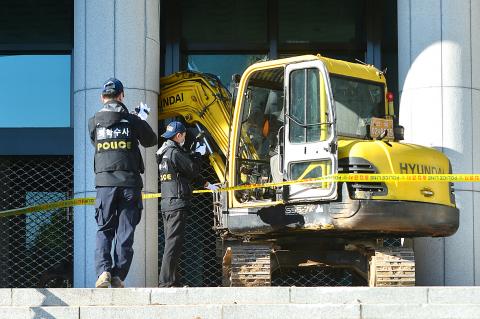South Korean police detained a man who yesterday rammed a large excavator into a gate near the office where prosecutors were questioning a woman at the center of a scandal that threatens the country’s president.
The attack with heavy construction equipment on the Supreme Prosecutors’ Office building in Seoul is part of a frenzy of emotion in South Korea over the woman, Choi Soon-sil, whom prosecutors have detained as they examine whether she used her close ties to South Korean President Park Geun-hye to pull government strings from the shadows and amass an illicit fortune.
Choi, 60, yesterday was held for a second day after being detained late on Monday to answer allegations of exerting inappropriate influence in state affairs.

Photo: Reuters
Worried that she might be a flight risk and could destroy evidence, prosecutors placed her under emergency detention without a warrant on Monday, Yonhap News Agency reported. Under local law, a suspect can be held without a warrant for up to 48 hours.
Prosecutors planned to file a court request for an arrest warrant today, Yonhap and other media said, citing a prosecution official.
Prosecutors were not immediately available for comment.
Choi arrived at the prosecutor’s office yesterday morning in handcuffs and a surgical mask and wearing a dark coat, escorted by correctional officers.
Although Choi was being questioned at another location, a man used an excavator to smash the front entrance of the Supreme Prosecutors’ Office building, injuring a security guard, in an apparent act of protest against Choi. He was arrested by police.
According to Han Jeung-sub, a senior official at the Seocho Police Station, the 45-year-old man told police: “Choi Soon-sil said she had committed a crime she deserves to die for, so I came here to help her die.”
The detained man was identified only by his surname, Jeong.
As she arrived for questioning on Monday, Choi, using a common expression of deep repentance in South Korea, said: “I committed a sin that deserves death.”
Last week, amid intense speculation, Park acknowledged that Choi had edited some of her speeches and provided public-relations help.
Widespread reports have said Choi had a larger role in government affairs despite having no official ties to the administration.
Prosecutors are trying to determine the scope of access Choi had and whether she was given sensitive presidential documents.
Prosecutors have asked eight banks for documents related to Choi’s financial transactions, Yonhap reported yesterday, citing unnamed financial industry officials.
The scandal has resonated with South Koreans in a way that past corruption allegations have not.
Some of this has to do with Park, who has long been criticized for an aloof manner and for relying on only a few longtime confidantes.
That she might have been outsourcing sensitive decisions to someone outside of government, and someone connected with a murky, lurid backstory, has incensed many.
Choi told the Segye Ilbo newspaper last week that she received drafts of Park’s speeches after Park’s election victory but denied she had access to other official material, or that she influenced state affairs or benefited financially.
The president last week said that she had given Choi access to speech drafts early in her term and apologized for causing concern among the public.
Park, 64, and Choi have known each other for decades, and the president said in a televised apology last week that her friend had helped her through difficult times.

Shamans in Peru on Monday gathered for an annual New Year’s ritual where they made predictions for the year to come, including illness for US President Donald Trump and the downfall of Venezuelan President Nicolas Maduro. “The United States should prepare itself because Donald Trump will fall seriously ill,” Juan de Dios Garcia proclaimed as he gathered with other shamans on a beach in southern Lima, dressed in traditional Andean ponchos and headdresses, and sprinkling flowers on the sand. The shamans carried large posters of world leaders, over which they crossed swords and burned incense, some of which they stomped on. In this

Indonesia yesterday began enforcing its newly ratified penal code, replacing a Dutch-era criminal law that had governed the country for more than 80 years and marking a major shift in its legal landscape. Since proclaiming independence in 1945, the Southeast Asian country had continued to operate under a colonial framework widely criticized as outdated and misaligned with Indonesia’s social values. Efforts to revise the code stalled for decades as lawmakers debated how to balance human rights, religious norms and local traditions in the world’s most populous Muslim-majority nation. The 345-page Indonesian Penal Code, known as the KUHP, was passed in 2022. It

Near the entrance to the Panama Canal, a monument to China’s contributions to the interoceanic waterway was torn down on Saturday night by order of local authorities. The move comes as US President Donald Trump has made threats in the past few months to retake control of the canal, claiming Beijing has too much influence in its operations. In a surprising move that has been criticized by leaders in Panama and China, the mayor’s office of the locality of Arraijan ordered the demolition of the monument built in 2004 to symbolize friendship between the countries. The mayor’s office said in

‘TRUMP’S LONG GAME’: Minnesota Governor Tim Walz said that while fraud was a serious issue, the US president was politicizing it to defund programs for Minnesotans US President Donald Trump’s administration on Tuesday said it was auditing immigration cases involving US citizens of Somalian origin to detect fraud that could lead to denaturalization, or revocation of citizenship, while also announcing a freeze of childcare funds to Minnesota and demanding an audit of some daycare centers. “Under US law, if an individual procures citizenship on a fraudulent basis, that is grounds for denaturalization,” US Department of Homeland Security Assistant Secretary Tricia McLaughlin said in a statement. Denaturalization cases are rare and can take years. About 11 cases were pursued per year between 1990 and 2017, the Immigrant Legal Resource